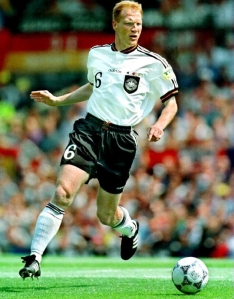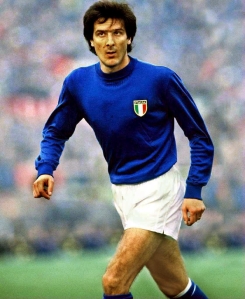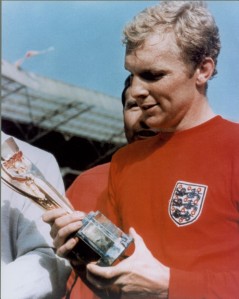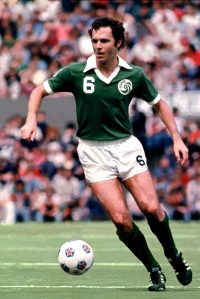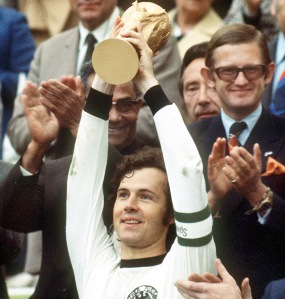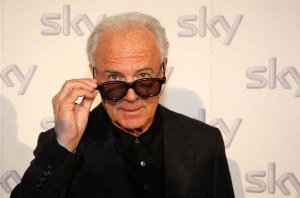The word Libero has always been a favourite of mine, even before I knew what it meant. Right up there with Catenaccio and Trequartista, it conjures up images of a different game played by strange, alien artisans that weave their spells around our hobnail-booted partisans before thumping them 4-0 at Wembley.
Whether or not the side is actually set up to accommodate an out-and-out sweeper – typically deployed behind a flat back four – many of the greatest sides have employed one anyway, usually playing alongside a bruising stopper, the idea being if you can’t stop them with brute force, maybe a more subtle approach will win the day.
With barely a hair out of place, and hardly a mark on their shorts even after playing in a quagmire, these upright pillars of the sporting community are a breed apart: officers in the trenches, if you will …
Think Bobby Moore.
Franz Beckenbauer.
Laurent Blanc.
Often technically good enough to play further up the pitch (Ledley King, Rio Ferdinand, Paul McGrath) to do so somehow dilutes their effectiveness for their art lies in reading the game and making a timely interception before launching the perfect pass to turn defence into attack … in about three seconds flat.
Play them in midfield and the defence is under more pressure than usual and you’re also usually losing a more mobile, box-to-box presence at the same time.
Let them stay back.
Let them surge forward.
For theirs is the glory game … and elegance personified.
And they usually wear the armband, too.
.
My Top 4 Sweepers … Ever.
#4
Matthias Sammer
One of the few East Germans to make a successful transition to the unified team, Matthias Sammer played a large chunk of his career in central midfield before being converted to a sweeper during his time at Borussia Dortmund, following spells with Dynamo Dresden, Stuttgart and Internazionale.
Player of the tournament at Euro 96, his perfectly timed tackling and elegant, surging runs seemed to sum up the German side: ruthless efficiency with minimal effort. In the same season he was also the first defender to be named European Player of the Year since compatriot Franz Beckenbauer in 1972.
Now FC Bayern’s Director of Football, Sammer also enjoyed success as a manager with Dortmund, winning the league in 2002, and as Technical Director for the national side.
.
.
#3
Gaetano Scirea
Gaetano Scirea was one of the first players I wanted to be as a kid, having initially seen him in action in the 1978 World Cup, and then again when Italy won the tournament in ’82. His peerless technique, composure and grace on the ball made him stand out not just amongst the cloggers usually populating the defence, but among footballers in general. When he crossed the halfway line, head up, ball at his feet, the crowd held its breath in unison, waiting for his next move as the rest of the Italian team scampered forward in anticipation of another killer through ball.
Famously never earning a red card throughout his entire career, Scirea formed a nigh-on impregnable partnership with the ultimate anti-hero, Claudio Gentile, the pairing perfectly representing everything that’s good and bad about Italian football at its very best.
One of only five players in history to win every single international club trophy recognised by UEFA and FIFA, his record at both club and international level is highly impressive and yet he remains a largely under-rated player, mainly due to the relative lack of TV coverage at the time compared to the modern age. One other possible reason may also be his tragic death at the age of 36 in a car crash in Poland: never given the chance to forge a post-playing career in coaching or the media, he rather faded from memory.
Since his death, various awards have been named in his honour, as well as a section of Juventus’ ground, where he plied his trade for most of his career.
Even now, I still think of him whenever anyone talks about a “skilled defender” … it’s just a shame most people don’t know who I mean when I say his name.
.
.
#2
Bobby Moore
They say only the good die young, and when Bobby Moore died in 1993 at the age of 51, the world of football seemed to stop turning for a while.
The first of the great ’66 team to pass away, the term legend hardly does him justice if you’re an Englishman. Widely regarded as the best defender of his era, Moore transcended mere sport and became a household name all over the world, in much the same way as his contemporaries Pele and George Best were, predating the kind of celebrity status enjoyed by the likes of Gazza, Beckham, Messi and Ronaldo by a good 20-30 years.
There were many things to admire about the man, but ultimately he was a world class player who just seemed to think and subsequently act more quickly than anyone else around him. He wasn’t blessed with pace, nor was he a giant, but those extra yards in his head meant that he always seemed to be in the right place at the right time, often without needing the Hollywood tackle … he simply stuck out a toe, nicked the ball and was away.
In the same way great strikers always seem to be there for the tap-in, instinctively Bobby Moore knew where to be to stop them.
If you‘ve never seen the great man in action, take two hours of your life to watch the entire 1966 final to see just how good he was.
In the meantime, maybe a quote from the staunchest of Scotsmen will suffice:
“There should be a law against him. He knows what’s happening 20 minutes before everyone else” (Jock Stein)
He was even pretty good in Escape To Victory …
.
.
.
#1
Franz Beckenbauer
How do you top a player like Bobby Moore ?
With another legend … that’s how.
Franz Beckenbauer is a winner, the personification of German excellence and the ultimate European statesman.
Not only the greatest German player of all time, winning the European Player of the Year award twice – once is unusual enough, as a defender – but he also stands head and shoulders above everyone else simply by being one of only two men in history to have won the World Cup both as a player and a manager, the other being Brazil’s Mario Zagallo. He’s also one of only two players to make the official FIFA World Cup Team of the Tournament three times (in 1966, 1970 and 1974), the other being another Brazilian, Djalma Santos. He’s also the only player to have won the European Cup three times as captain of his club, FC Bayern, between 1974-76. Ever the pioneer, he then moved to the USA where, alongside the likes of Pele and George Best, he helped introduce the game of sawker to a whole new audience by playing in the nascent NASL.
With the ability to play in both midfield and at the back, he virtually created the modern sweeper role single-handedly, and could switch seamlessly between defence and attack depending on the needs of the team. Like the other players on this shortlist, he never seemed flustered and always ran with his head up, looking for the killer pass. Blessed with an athleticism to take him beyond the likes of even Moore and Scirea, his box-to-box influence was total, and his sheer determination and will to win meant he carried that influence on into an illustrious post-playing career.
As manager of Marseille he won the French league, before returning to lead Bayern to the championship in 1994, followed by the UEFA Cup in 1996, all of which happened after he’d won the World Cup as manager of the nationalmannschaft in 1990, following the runners-up medal in 1986.
The list goes on, but Beckenbauer is beyond mere facts and figures … he simply IS German football, and that is high praise indeed.
Honourable mentions: Ruud Krol, Rio Ferdinand, Laurent Blanc, Alan Hansen, Fernando Hierro, Paul McGrath … and Gareth Southgate.

